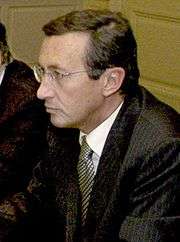Rome municipal election, 1993
| | ||||||||||||||||||||||||||||
| ||||||||||||||||||||||||||||
| ||||||||||||||||||||||||||||
| ||||||||||||||||||||||||||||
Municipal elections were held in Rome on 21 November 1993 with a second round on 5 December. The center-left candidate Francesco Rutelli (Greens) faced the neo-fascist candidate Gianfranco Fini.
Control of the 19 circoscrizioni of the Italian capital was also to be decided in the elections. 55 councillors were due to be elected in the City Council.
As a result of the election, Fini was defeated by Rutelli on the second round. The center-left controls 36 seats against for the center-right.
Background
With the Law of 25 March 1993, n. 81 was introduced the direct election of mayor and the appointment of members of the giunta by the same, whereas previously the mayor as much as the council were elected by the municipal council. In this way the form of government of the town, previously attributed to the parliamentary model, was approached at the presidential model. The same law had fixed four-year term of office of Mayor, later extended to five (Law no. 267/2000).
The election took place in a period of changes for the Italian politics: the scandal called Tangentopoli, which described pervasive corruption in the Italian political system, exposed in the 1992-6 Mani Pulite investigations, led to the collapse of the hitherto dominant Christian Democracy party and its allies also in the municipal political situation.
Mayoral Elections
For the first time a center-left coalition, composed by the ex-communist Democratic Party of the Left and some other progressives party, presented its candidate: Francesco Rutelli. He was a young politician, who had been a member of the Italian Radicals then a member of the Federation of the Greens.
The main opposition to Rutelli's coalition was represented by the neo-fascist candidate Gianfranco Fini; Fini was a young politician considered the inheritor of Giorgio Almirante's political knowlodge in the Italian Social Movement. Fini and his party were very popular in Rome: their popularity, originated from the Fascist period during the Second World War, was increased by the political scandal which had invested the historical party as Christian Democracy or the Italian Socialist Party. However Fini's popularity continued also after the 1993 election: in fact since then, all the candidates substained by the center-right coalition were members of neo-fascist party National Alliance.
Although the political crisis, Christian Democracy presented its candidate, Carmelo Caruso, who was substained also by the Italian Democratic Socialist Party.
However there were also many other candidates, from very small parties, civic lists or associations; the most famous of this small party was th Love Party, a party in favor of sexuality in the libertarian sense, whichi candidated the pornstars Moana Pozzi.
The election was distinguished by the active involvement of "unprecedented" numbers of Italian nobles as either candidates or supporters, including members of the Barberini, Orsini, Chigi, and Borghese families, inspired by the recent publication of Plinio Corrêa de Oliveira's Nobility and Analogous Traditional Elites in the Allocutions of Pius XII.[1]
Voting System
The voting system is used for all mayoral elections in Italy, in the city with a population higher than 15,000 nhabintants. Under this system voters express a direct choice for the mayor or an indirect choice voting for the party of the candidate's coalition. If no candidate receives 50% of votes, the top two candidates go to a second round after two weeks. This gives a result whereby the winning candidate may be able to claim majority support, although it is not guaranteed.
For circoscrizioni the voting system is the same, not referred to the mayor but to the president of the circoscrizione.
The election of the City Council is based on a direct choice for the candidate with a preference vote: the candidate with the majority of the preferences is elected. The number of the seats for each party is determined proportionally.
Results
| Rome Mayoral Election Results 1993 | ||||||||
|---|---|---|---|---|---|---|---|---|
| Name | Party | 1st Round (November 21) | % | 2nd Round (December 5) | % | |||
| Francesco Rutelli | Greens | 684,529 | 39.6 | 955,859 | 53.1 | |||
| Gianfranco Fini | Italian Social Movement (MSI) | 619,309 | 35.8 | 844,030 | 46.9 | |||
| Carmelo Caruso | Christian Democracy (DC) | 197,801 | 11.4 | |||||
| Renato Nicolini | Communist Refoundation Party (PRC) | 143,364 | 8.3 | |||||
| Rome Council Election 1993 - Parties | ||||||||
|---|---|---|---|---|---|---|---|---|
| Coalition | votes | % | seats | Party | votes | % | seats | |
| Center-left (Rutelli) | 479,030 | 37.2 | 36 | Democratic Party of the Left Greens Italian Radicals Others (1) | 233,924 136,753 45,082 63,271 | 18.2 10.6 3.5 4.9 | 19 10 2 5 | |
| Right (Fini) | 430,278 | 33.4 | 15 | Italian Social Movement Others (1) | 399,594 30,684 | 31.0 2.4 | 14 1 | |
| Center (Caruso) | 181,437 | 14.2 | 5 | Christian Democracy Union of the Centre Italian Democratic Socialist Party Others (1) | 154,552 12,392 11,333 3,160 | 12.0 1.1 0.9 0.2 | 5 - - - | |
